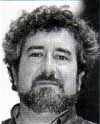Rather than an abstract study of language, distinguished scholar Richard Martin says folklore, social anthropology, the study of performance, and linguistics all contribute to his approach to Homeric poetry, and “how it existed as a performance art in Ancient Greece, as opposed to the way that we conceptualize it — as written text.” In fact, Martin compares ancient Greek poetry with modern rap.

Martin
Martin is the 2009 John and Penelope Biggs Resident in the Classics at Washington University in St. Louis, and will deliver the Assembly Series lecture at 4 p.m. on Thursday, April 9 in Steinberg Hall Auditorium.
In his talk, “Finding Homer in the 21st Century,” he will present an overview of current Homeric research, then discuss his own fieldwork in Crete, interviewing people who still memorize the traditional oral epics and recording them singing these poems.
On the preceding Monday, April 6, he will speak on “Apollo the Player” at a 4:15 p.m. colloquium in the Women’s Building Formal Lounge.
Martin is the Antony and Isabelle Raubitschek Professor in Classics at Stanford University. Before coming to Stanford in 2000, he taught classics for 18 years at Princeton University.
Born and raised in Boston, Martin studied medieval and modern Irish language and literature at Harvard University, where he received an A.B. in Classics and Celtic Literature, and an A.M. and Ph.D. (1981) in Classical Philology.
He is a senior fellow at the Center for Hellenic Studies in Washington and a member of the American Philological Association.
Among his numerous publications are Myths of the Early Greeks (2003), The Language of Heroes: Speech and Performance in the Iliad (1989), Healing, Sacrifice, and Battle: Amechania and Related Concepts in Early Greek Poetry (1983), and he edited Bulfinch’s Mythology (1991).
The events are free and open to the public. Steinberg Hall is located near the corner of Skinker and Forsyth on the WUSTL Danforth campus.
For more information, call (314) 935-5123 or visit the Assembly Series Web page (http://assemblyseries.wustl.edu).